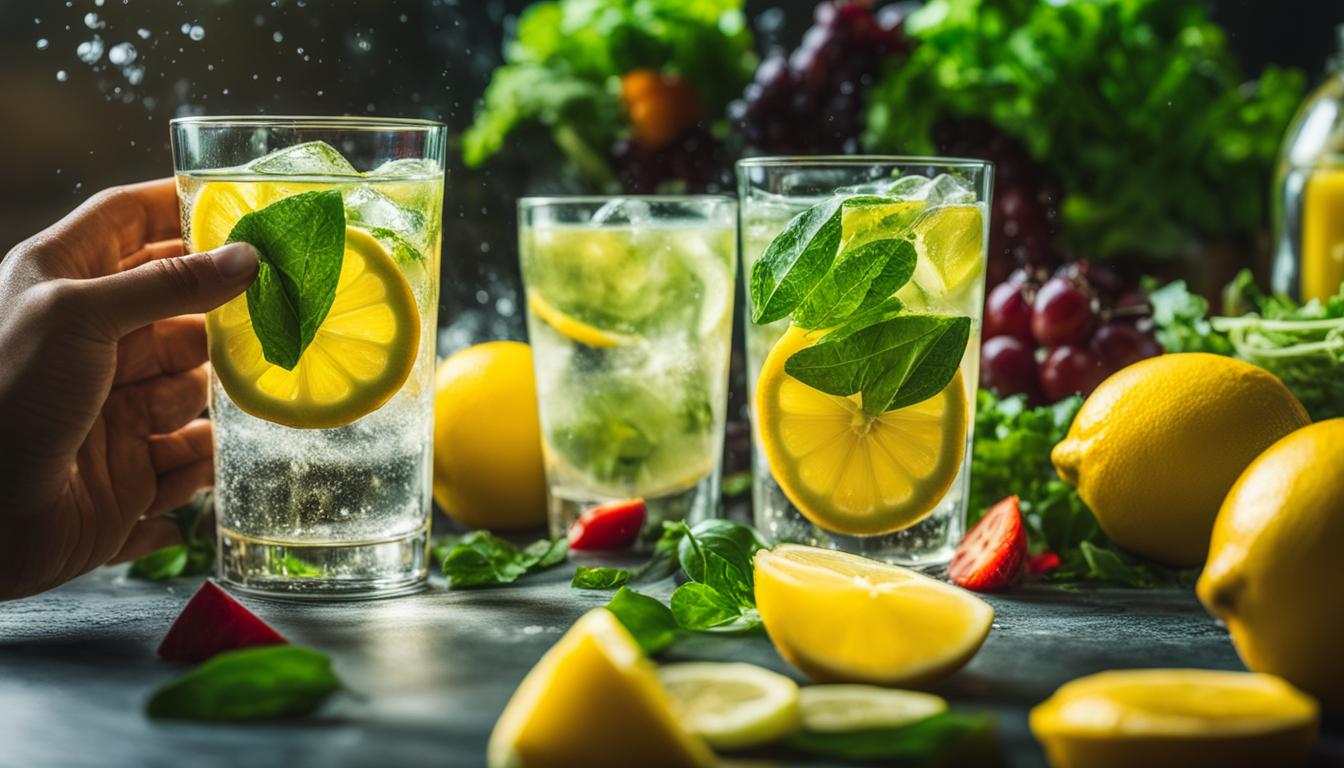Are you looking for an effective and natural way to detoxify your body? Look no further than the water diet for detoxification. By incorporating water into your daily routine, you can support your body’s natural detoxification processes and experience a wide range of benefits. In this guide, we will explore the benefits of a water diet, provide you with detox water recipes, and share tips on how to effectively detox with water. Get ready to rejuvenate your body and embrace a healthier lifestyle.
Key Takeaways:
- Water diet is a natural way to detoxify your body
- Detox water recipes can be easily prepared at home
- Water detox helps cleanse your system and promote weight loss
- There are various methods to incorporate water detox into your routine
- By following a water diet, you can revitalize your body and improve your overall well-being
What is a Full Body Detox?
A full body detox involves following a specific diet or using special products to rid your body of toxins. However, it’s important to understand that the body naturally detoxifies itself and doesn’t require these external interventions for toxin elimination. Detox diets often include the use of various supplements, but they rarely specify the specific toxins they aim to remove or the mechanism by which they eliminate them. In reality, your body already has sophisticated natural detoxification processes in place.
Detoxification is a continuous process that occurs through the liver, kidneys, digestive system, skin, and lungs. These organs work together to break down and eliminate harmful substances from your body. Through these natural detoxification processes, your body can rid itself of toxins and maintain overall health. While detox diets may seem appealing, it’s important to recognize that they don’t offer anything that your body can’t already do on its own.
Instead of relying on detox diets, you can optimize your body’s natural detoxification system by adopting healthy habits such as limiting alcohol consumption, emphasizing quality sleep, drinking plenty of water, reducing sugar and processed food intake, eating antioxidant-rich foods, and supporting your digestive system. These lifestyle changes can help support your body’s natural detoxification processes and promote overall wellness.
Limit Alcohol for a Healthy Liver
Excessive alcohol consumption can have detrimental effects on liver function and lead to liver damage. When we consume alcohol, our liver metabolizes it and converts it into a chemical called acetaldehyde, which is known to cause cancer. The liver then works to eliminate acetaldehyde from our bodies. However, excessive drinking can impair the liver’s ability to function properly, leading to fat buildup, inflammation, and scarring.
To support our body’s natural detoxification system and maintain a healthy liver, it is crucial to limit our alcohol intake. The recommended alcohol consumption guidelines are no more than one drink per day for women and two drinks per day for men. However, it is even better to abstain entirely from alcohol. By reducing our alcohol consumption, we can help protect our liver and promote overall health.
Remember, our liver plays a vital role in detoxification, so it’s important to take care of it by making responsible choices when it comes to alcohol consumption.

Benefits of Limiting Alcohol Consumption
- Promotes liver health and function
- Reduces the risk of liver damage
- Supports the body’s natural detoxification processes
- Improves overall health and well-being
- Reduces the risk of developing alcohol-related diseases
“Excessive alcohol consumption can have detrimental effects on liver function and lead to liver damage.”
Table: Alcohol Consumption Guidelines
| Category | Alcohol Consumption Limit |
|---|---|
| Women | No more than one drink per day |
| Men | No more than two drinks per day |
Emphasize Sleep for Detoxification
Adequate sleep is crucial for the body’s natural detoxification processes. When we sleep, our brain undergoes essential functions that include reorganizing, recharging, and removing toxic waste byproducts that accumulate throughout the day. One such waste product is a protein called beta-amyloid, which is associated with the development of Alzheimer’s disease. Lack of sleep can hinder these necessary processes and lead to the buildup of toxins in our body.
Poor sleep has been linked to various short-term and long-term health consequences, such as increased stress, anxiety, high blood pressure, heart disease, type 2 diabetes, and obesity. By prioritizing sleep, we can support our body’s detoxification system and improve our overall health and well-being.
It is recommended to aim for 7 to 9 hours of quality sleep per night to support detoxification and allow our body to perform its essential functions. Establishing healthy sleep habits, such as maintaining a regular sleep schedule, creating a relaxing bedtime routine, and ensuring a comfortable sleep environment, can promote restful sleep and optimize our body’s natural detoxification processes.

Getting enough sleep is not only essential for detoxification but also for our overall health and vitality. By prioritizing quality sleep, we can support our body’s natural detoxification processes, enhance cognitive function, improve mood, boost immune health, and increase energy levels. Remember, a good night’s sleep is one of the most effective ways to revitalize our body and embrace optimal well-being.
Drink More Water for Detoxification
When it comes to detoxification, one of the most important steps you can take is to drink more water. Water plays a crucial role in the body’s natural detoxification processes, helping to regulate body temperature, lubricate joints, aid in digestion and nutrient absorption, and remove waste products from the body.
Every day, our body’s cells release waste products such as urea and carbon dioxide. These waste products can be harmful if they build up in the blood. That’s where water comes in. Water helps transport these waste products and eliminate them through urination, breathing, and sweating.
To support your body’s detoxification system, it is recommended to consume 125 ounces (3.7 liters) of water per day for men and 91 ounces (2.7 liters) for women. Of course, the exact amount may vary depending on individual factors such as diet, location, and activity level. But by ensuring you stay properly hydrated, you give your body the tools it needs to effectively eliminate toxins and waste.
| Benefits of Drinking More Water for Detoxification | How Much Water Should You Drink? |
|---|---|
| Regulates body temperature | Men: 125 ounces (3.7 liters) per day |
| Lubricates joints | Women: 91 ounces (2.7 liters) per day |
| Aids in digestion and nutrient absorption | Varying amounts based on individual factors |
| Removes waste products from the body |
“Water is the driving force of all nature.” – Leonardo da Vinci
Remember, water is an essential component of our body’s detoxification system, and staying adequately hydrated is key to supporting this process. So, make sure to prioritize your water intake and drink up for optimal detoxification!
Reduce Sugar and Processed Foods for Detoxification
Sugar and processed foods are major culprits when it comes to hindering our body’s natural detoxification process. Excessive consumption of these items has been linked to various chronic diseases such as obesity, heart disease, cancer, and diabetes. These conditions can severely impact organs involved in detoxification, such as the liver and kidneys. That’s why it’s crucial to take steps to reduce our intake of sugary and highly processed foods.
By avoiding products with added sugars or artificial sweeteners and focusing on whole, unprocessed foods like fruits and vegetables, we can support our body’s detoxification system. These natural foods are rich in fiber, vitamins, and minerals, which aid in the elimination of toxins and contribute to overall health. Opting for healthier choices over junk food can help keep our body’s detoxification system healthy and functioning optimally.
It’s important to be mindful of the ingredients in the foods we consume and make informed choices. Reading food labels and being aware of hidden sugars and additives can go a long way in reducing our sugar and processed food intake. By making gradual changes to our diet and incorporating more nutrient-dense, whole foods, we can support our body’s natural detoxification process and improve our overall well-being.
Remember, we are unique individuals, and it’s important to listen to our bodies and consult with a healthcare professional before making significant dietary or lifestyle changes. By reducing our consumption of sugar and processed foods, we can take an important step towards revitalizing our bodies and embracing a healthier lifestyle.
Antioxidant-Rich Foods for Detoxification
Your body is constantly exposed to free radicals, which can cause oxidative stress and damage to your cells. Fortunately, you can support your body’s natural detoxification processes by incorporating antioxidant-rich foods into your diet. Antioxidants are substances that help neutralize free radicals and reduce oxidative stress, promoting overall health and well-being.
One way to ensure you’re getting enough antioxidants is to focus on a colorful and varied diet. Fruits and vegetables are excellent sources of antioxidants, with each color indicating a different group of beneficial compounds. For example, berries are rich in anthocyanins, while leafy greens are packed with carotenoids and flavonoids.
Some antioxidant-rich foods you can include in your diet are:
- Blueberries
- Spinach
- Kale
- Broccoli
- Oranges
- Red bell peppers
- Dark chocolate
By incorporating these antioxidant-rich foods into your meals and snacks, you can support your body’s natural detoxification processes and protect against oxidative damage. Remember to choose organic produce whenever possible to reduce exposure to pesticides and other harmful chemicals.
Benefits of Antioxidant-Rich Foods
The consumption of antioxidant-rich foods can have numerous benefits for your health. Here are a few key advantages:
- Reduced Oxidative Stress: Antioxidants help neutralize free radicals, reducing oxidative stress and lowering the risk of chronic diseases.
- Improved Heart Health: Antioxidant-rich foods can support cardiovascular health by reducing inflammation and oxidative damage to blood vessels.
- Enhanced Brain Function: Antioxidants have been shown to improve cognitive function and protect against age-related decline.
- Lowered Cancer Risk: Some antioxidants, such as those found in berries and cruciferous vegetables, have been linked to a reduced risk of certain types of cancer.
- Anti-Aging Effects: Antioxidants can help slow down the aging process by reducing cellular damage caused by free radicals.
Overall, incorporating antioxidant-rich foods into your diet is a simple and effective way to support your body’s natural detoxification processes and promote optimal health.
Table: Antioxidant-Rich Foods
| Foods | Antioxidants |
|---|---|
| Blueberries | Anthocyanins |
| Spinach | Carotenoids, Vitamin C, Vitamin E |
| Kale | Carotenoids, Vitamin C, Vitamin K |
| Broccoli | Glucosinolates, Vitamin C |
| Oranges | Vitamin C, Flavonoids |
| Red bell peppers | Vitamin C, Carotenoids |
| Dark chocolate | Flavonoids |
Support Your Digestive System for Detoxification
The digestive system plays a crucial role in detoxification and immune health. By supporting your gut health, you can optimize your body’s natural detoxification processes. One way to do this is by including fiber-rich foods in your diet. Fiber helps promote healthy digestion and aids in the elimination of toxins from the body.
Some examples of fiber-rich foods include:
- Fruits such as apples, berries, and oranges
- Vegetables like broccoli, carrots, and spinach
- Whole grains such as oats, quinoa, and brown rice
In addition to fiber, incorporating prebiotics into your diet can further support your gut health. Prebiotics are a type of fiber that feeds the good bacteria in your gut, promoting a healthy balance of gut flora. Foods rich in prebiotics include tomatoes, artichokes, bananas, asparagus, onions, garlic, and oats.
Conclusion
Cleansing and detoxifying your body can have numerous benefits for your overall health and well-being. By following the guidelines discussed in this guide, such as limiting alcohol, emphasizing sleep, drinking more water, reducing sugar and processed foods, eating antioxidant-rich foods, and supporting your digestive system, you can promote your body’s natural detoxification processes and improve your vitality.
Remember that every body is unique, so it’s important to pay attention to your body’s needs and consult a healthcare professional before making significant dietary or lifestyle changes. By embracing a water diet for detoxification and incorporating these practices into your routine, you can revitalize your body and embrace overall wellness.
FAQ
What is a full body detox?
A full body detox typically involves following a specific diet or using special products that claim to rid your body of toxins. However, the body naturally detoxifies itself and doesn’t require special diets or supplements for toxin elimination.
Why should I limit alcohol for a healthy liver?
Alcohol consumption affects liver function and can lead to liver damage. To support your body’s detoxification system, it’s best to limit alcohol intake to one drink per day for women and two drinks per day for men, or abstain entirely.
How does sleep impact detoxification?
Adequate sleep is essential for the body’s natural detoxification processes. While you sleep, your brain reorganizes, recharges, and removes toxic waste byproducts that accumulate throughout the day. It’s recommended to aim for 7 to 9 hours of sleep per night to support detoxification and overall health.
How much water should I drink for detoxification?
Water plays a crucial role in detoxification by regulating body temperature, aiding digestion, and removing waste products from the body. It’s recommended to consume 125 ounces (3.7 liters) of water per day for men and 91 ounces (2.7 liters) for women. The exact amount may vary depending on individual factors such as diet, location, and activity level.
Why is it important to reduce sugar and processed foods for detoxification?
Excessive consumption of sugar and processed foods is linked to various chronic diseases, such as obesity, heart disease, cancer, and diabetes. These conditions can harm organs involved in detoxification, such as the liver and kidneys. To support your body’s detoxification system, it’s important to reduce your intake of sugary and highly processed foods.
How can antioxidant-rich foods aid in detoxification?
Antioxidants protect cells against damage caused by free radicals, which are molecules that can contribute to various conditions. Eating a diet rich in antioxidants can help counteract oxidative stress caused by free radicals and other toxins. Focus on getting antioxidants from food rather than supplements. Foods like berries, fruits, nuts, cocoa, vegetables, spices, and beverages like coffee and green tea are high in antioxidants and can aid in detoxification.
How can I support my digestive system for detoxification?
A healthy digestive system is crucial for proper detoxification and immune health. Including foods rich in fiber, such as fruits, vegetables, and whole grains, can support gut health and aid in the elimination of toxins. Prebiotics, a type of fiber that feeds the good bacteria in your gut, can enhance your digestive and detoxification systems.




